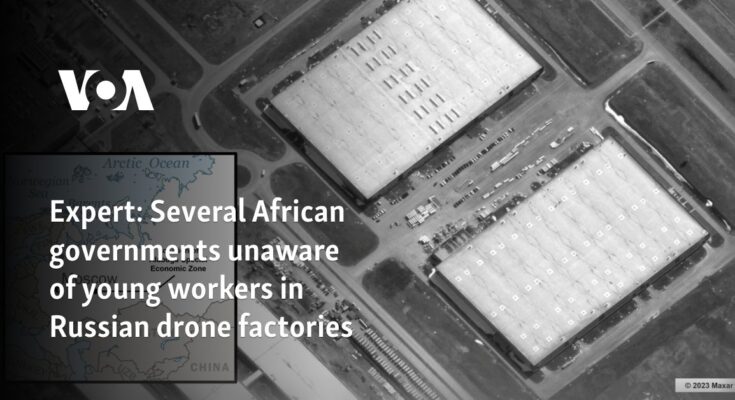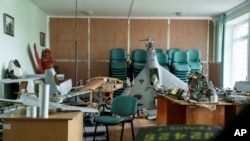They were promised the opportunity to earn money, get an education abroad, and gain work experience. Instead, they found themselves assembling military drones in Russia and, in one case, were attacked by a Ukrainian drone.
A series of investigative reports have highlighted a Russian labor recruitment program that allegedly lured young African women to work in an industrial park in a Russian province with false promises and forced them to contribute to the Kremlin’s war effort in Ukraine.
Victims of the programme, which attracts recruits largely through online job advertisements, include women from Uganda, Rwanda, Kenya, South Sudan, Sierra Leone and Nigeria.
Media reports from the Associated Press, The Wall Street Journal, The Washington Post Others have exposed the operation, titled Alabuga Start, but Voice of America reporting found that African countries have largely failed to intervene or provide a formal response. Some appear to be building relationships with the Russian entity behind the program.
This entity, called the Alabuga Special Economic Zone, has intensified its reach across the African continent, according to David Albright, founder of the Institute for Science and International Security and the researcher behind a report exposing the program that exploits young women. “In some of the initial investigations into this, the recruiters in Africa were oblivious when asked where these women were going,” Albright said, adding that some were now aware and that he hoped there would be “pushback from these governments about what… You will go to him.” exactly [Alabuga is] Recruit these women to do.”
Representatives from Alabuga recently visited Sierra Leone, Zambia and Madagascar, Albright said, and signed memorandums of cooperation with local organizations, despite reports of deceptive hiring practices and questionable labor procedures.
Albright said young women are forced to handle toxic materials, which he says is prohibited in Russian labor law. But African and other governments were also willing to send their citizens to Alabuga START. The Voice of America discovered a series of documents online indicating that government ministries officially promoted the program.
VOA reached out to authorities in Uganda, Rwanda, Kenya, South Sudan, Sierra Leone, Ethiopia and Nigeria, but numerous emails and phone calls went unanswered. Voice of America also requested comment from Alabuga and the Russian Embassy in Washington but received no response.
Recruitment under false pretenses
The city of Yelabuga, known as Alabuga in the local Tatar language, is located 1,000 kilometers east of Moscow in Russia’s Tatarstan region, and would hardly seem a desirable location for young people from Africa.
But the nearby Alabuga Special Economic Zone was casting a wide net over the African continent. The promotional materials paint an exciting and optimistic picture of life in the Alabuga Start programme.
In one recruitment video aimed at attracting potential recruits, an African woman arrives in Alabuga and begins working in a restaurant, where she waits for a young Russian man. At the end of the video, she returns to the restaurant as his pregnant wife.
Other promotional videos show participants working in construction, cleaning and warehouse operations, as well as studying and exercising with their friends. Only one video shows women assembling drones, but there is no indication that the drones have a military purpose.
According to independent Russian news outlet Protocol, the program specifically targets young women because its organizers believe that young men from Africa “can be very aggressive and dangerous.”
Researchers and reporters found that some of the program’s internal documents, As reported by Albright et alwomen are often referred to as mulattos using an outdated racist term that is now widely considered offensive.
Its appeal for young Africans is not difficult to understand, says Maxim Matosevich, an expert on Russia and Africa and professor of global history at Seton Hall University.
“A lot of these countries have very high unemployment rates,” he told Voice of America. Russia “presents them with attractively packaged and attractively sold job offers.”
Matusevich believes that the Alabuga project aims to solve the problem of labor shortages in Russia due to the high demand for the war in Ukraine.
Albright said inaction has global repercussions: The Alabuga Initiative is working to involve young Africans in Russian violence against Ukrainians.
“It was a very deceptive program in the sense that the applicants were essentially unaware that they would be working in the United States – [and] A European-sanctioned company manufactures drones used to cause devastating effect against Ukrainian civilian targets, energy targets and electrical plants.”
He added: “And so, in this sense, they are complicit in a crime, an international crime, given that the war against Ukraine is illegal. They are involved in making drones that are used against civilian targets, not just military targets.” “
Exploitation plant
Alabuga did not start by exploiting young African women. Before that, it used young Russians to produce drones.
Since 2019, the SEZ has operated a program called Alabuga Polytech, which recruits Russian high school students. Unlike workers from the African continent and other countries, Russian students participate in a four-year work-study program and receive accredited technical education while doing industrial work.
After Russia’s invasion of Ukraine in February 2022, this program intensified its activity. It wasn’t entirely smooth sailing. When the program shifted to producing drones, Alabuga had to pressure Russian authorities to change labor laws. According to a July report From the Institute for Science and International Security, which allowed Alabuga to hire children under 18 to work with toxic chemicals.
Parents soon began complaining about poor working conditions: Participants were working 12-hour shifts at the factory, and their movements were strictly controlled, Albright recounted. The program has since stopped recruiting people under 18, he said.
When the SEZ launched the Alabuga Start program and began recruiting workers from abroad in 2022, the program was almost entirely focused on drone production.
The Albright Organization estimates that only a third of Polytech students work in drone production, while more than 90% of Alabuga Start program participants do so.
Despite this stark distinction, organizers appear to have often conflated the two programmes, including by sometimes depicting Alabuga Start participants wearing school uniforms in promotional materials.
Multinational conveyor belt
Alabuga’s recent outreach to African countries indicates a potential expansion of recruitment efforts.
Voice of America found that African and other governments were sometimes willing partners. The Nigerian Federal Ministry of Education shared on its website Document announcing open admission To Alabuga starting in 2023.
Ministry of Education and Sports of Uganda Share a similar ad. On document upload site Scribd, digital document library, VOA I found Melvin Which They appear to be official letters The government ministries of Mali and Burkina Faso announce that the Alabuga Start Program has reserved places for participants from those countries in 2023.
Voice of America also found A Document issued by the Bangladesh Manpower Employment and Training Bureau Announcing the opening of applications for the Alabuga Start Program in 2023.
The SEZ’s numerous meetings with African diplomats and government officials, some of which included the signing of memorandums of understanding, appear to indicate a deepening of relations.
Albright confirms that the drone factory in the Special Economic Zone served as the focus of Russian-Iranian cooperation during the war against Ukraine.
“Alabuga is a special economic zone that mainly constructs, rents or sells buildings to the civil industry,” he said. “With the war in Ukraine, its international occupiers withdrew and were in dire need of money. Therefore, they entered into a contract with the Russian government and the Iranian government to build drones.”
The Alabuga factory in question primarily assembled the Shahed-136, an Iranian suicide drone.
In the first half of 2023, about 100 Alabuga University of Technology students traveled to Tehran for two months for training on the production of Shahed-136 airframes, The Washington Post Reported in August 2023.
Alabuga Start participants are largely used as low-skilled labor, tasked with completing the simplest tasks associated with assembling airframes. A list of 100 Russian words that participants must know to participate in the program leads to this conclusion. It consists largely of basic vocabulary but also includes several higher-level words: “to hook,” “to unhook,” “factory,” and “task.”
The military nature of the action is largely absent from the promotional materials for the program seen by the Voice of America. It typically shows participants working in the service industry, construction, or non-military industrial production.
One brochure asserts that after completing the Alabuga Start program, participants have the opportunity to continue working on a permanent basis, get a job at another factory in Alabuga, or enroll at Polytech.
It also includes images that appear to view articles by Financial Times and The Wall Street Journal With titles praising the factory and its salaries. In fact, the photos have been edited to hide the fact that both stories are about military drone production at the facility.
This action has put African women in direct danger. On April 22, a Ukrainian drone crashed into the residence where Alabuga Start participants lived.
A day later, Alabuga started Video released It features a Kenyan woman – one of the show’s audience-facing participants – who says she will work in a café. In particular, the participant said that she came to work and study at Alabuga Polytech, not at Start.
“Those who attacked our hostel today are true barbarians and deserve serious condemnation,” she said. “In my opinion, they wanted to intimidate us. But I want to tell you that they did not succeed. You will not intimidate me, because Alabuga is a strong place and we will get through this.”
This story is a collaboration between the Voice of America’s Africa Department and the Voice of America’s Russian Service.
https://gdb.voanews.com/17621E2D-05A3-4E75-93F3-269715CAF559.jpg
2024-12-19 04:29:30






